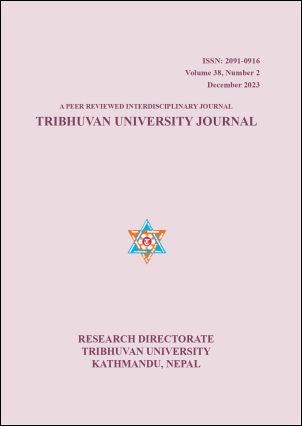Sri Aurobindo-The Pioneer of Human Unity: Relevance in Today’s World
DOI:
https://doi.org/10.3126/tuj.v38i2.60775Keywords:
gnostic being, higher mind, unity, integral yoga, supermindAbstract
Sri Aurobindo was one of the thinkers and philosophers who emerged in the pure land of India in the nineteenth century. The transition of the revolutionary Aurobindo to the sage Aurobindo, who participated in the liberation war of the country from colonial rule and exploitation by the imperialist British power, was a breakthrough moment. In Sri Aurobindo’s thinking, at the meeting place of our world consciousness, the inanimate is real to the mind (cit), and so is the truth to the mind and inanimate because the world is the soul and mind pervaded by consciousness, the light of one whole being. They are bridges between two entities. In this article, I shall discuss the aspect of Sri Aurobindo’s establishment of universal unity by referring to the different aspects of his transition to the superman through the stages of the higher mind, illuminated mind, intuitive mind, and overmind. Next, I will analyse Sri Aurobindo's concept of unity through yoga. I shall also focus on the enlightened awareness of spiritual unity following Sri Aurobindo. Then, how Sri Aurobindo explains the real progress of civilization through Supermind will be discussed briefly. Next, I would also highlight Sri Aurobindo’s thought on the integral approach to human unity. Finally, I would like to conclude the paper through a discussion of contemporary relevance and the need for real unity today.
Downloads
Downloads
Published
How to Cite
Issue
Section
License
This license enables reusers to distribute, remix, adapt, and build upon the material in any medium or format for noncommercial purposes only, and only so long as attribution is given to the creator.
© Center for Research, Tribhuvan University

